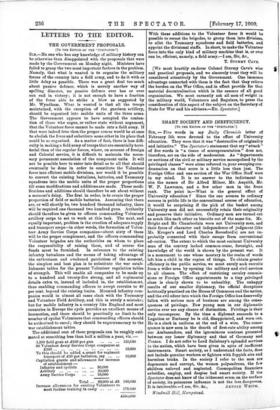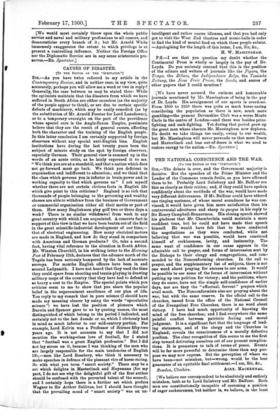SMART SOCIETY AND INEFFICIENCY.
[To THE EDITOR OF THE "SPECTATOR.") — Five words in my Daily Chronicle letter of February 5th were devoted to the effect of University education. They were that it was "destructive of originality and initiative." The Spectator's statement that my " attack " of five words is "a tissue of misrepresentation" does not, therefore, err on the side of moderation. As "departments or sections of the civil or military service monopolised by the privileged classes " were alone referred to, your sweeping con- demnation on that score is a little less than just. The Foreign Office and one section of the War Office Staff were in my mind. It is no answer to the indictment to cite the names of Sir Alfred Milner, Mr. Asquith, Mr. W. P. Lawrence, and a few other men in the front rank. The point is,—What is the general effect of University education F Since the one avenue to ordinary success in public life is the conventional course of education, it would be surprising if the pick of the basket among University men did not successfully retain their originality and preserve their initiative. Ordinary men are turned out as much like each other as biscuits out of the same tin. Mr. Bright and Mr. Chamberlain were not University men, and their force of character and independence of judgment (like Mr. Kruger's and Lord Charles Beresford's) are not im- probably connected with their escape from conventional edecation. The extent to which the most eminent University man of the century lacked common-sense, foresight, and knowledge of the world is shown by the present war. It is a monument to one whose mastery in the realm of words left him a child in the region of things. To obtain greater efficiency in the public service, we must surely seek recruits from a wider area by opening the military and civil services to all classes. The effect of restricting cavalry commis- sions or Foreign Office appointments to a tiny privileged class is clearly shown to be unhealthy. The unhappy results of our smaller diplomacy, the official deceptions habitually practised on the House of Commons and the nation, and the evil odour into which the Foreign Office has deservedly fallen with serious men of business are among the conse- quences of privilege. Few young men in our diplomatic service ever see any chance of distinction. Privilege is their only recompense. By the time a diplomat succeeds to a Legation or Embassy he is old, disappointed, and worn out. He is a clerk in uniform at the end of a wire. The conse- quence is now seen in the dearth of first-rate ability among our Ambassadors, and the ignominous contrast presented between our leaser diplomacy and that of Germany and France. I do not refer to Lord Salisbury's splendid services to the nation, which have been given in spite of inefficient instruments. Smart society, as I understand the facts, does not include genuine workers or fighters with foppish airs and harmless tricks. In the society I refer to the men are degenerate and corrupt, the women polyandrous, the few children unloved and neglected. Cosmopolitan financiers subsidise, employ, and despise bad smart society. If the Spectator does not know of the iridescent scum on the surface of society, its poisonous influence is not the less dangerous.
It is intolerable.—I am, Sir, &c., ARNOLD WHITE.
Windmill Hill, Hampstead. [We would most certainly throw open the whole public service and naval and military professions to all comers, and democraticise every branch of it ; but Mr. Arnold White immensely exaggerates the extent to which privilege is at present a controlling influence. Neither the Foreign Office nor the Diplomatic Service are in any sense aristocratic pre- serves.—ED. Spectator.]







































 Previous page
Previous page